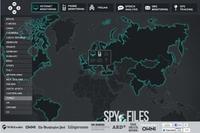-
Major surveillance law heading toward its own end-of-year cliff

While coverage of the tense negotiations over a resolution to the fiscal cliff threat has dominated the media, the Foreign Intelligence Surveillance Amendments of 2008 is heading for a cliff of its own, as the provisions of the act are set to expire at the end of the year
-
-
Jill Kelly’s FBI friend helped launch the investigation, then tipped lawmakers
Jill Kelly, a Petraeus family friend, was warned in a series of anonymous e-mails not to get too close to CIA director David Petraeus; Kelly contacted a friend who worked in the FBI Tampa office, and he persuaded the agency cyber squad to investigate; in late October, fearing that FBI director Robert Muller would sweep the investigation’s results under the rug, he contacted Rep. David Reichert (R-Washington), who, in turn, alerted the majority whip, Rep. Eric Cantor (R-Virginia); the Tampa agent is now under investigation by the Office of Professional Responsibility, the internal-affairs arm of the FBI
-
-
Electronic surveillance by U.S. law enforcement agencies has increased dramatically

According to data obtained by the American Civil Liberties Union (ACLU), U.S. law enforcement’s surveillance of e-mails and other Internet communication has skyrocketed in the last two years; some forms of surveillance have increased 361 percent
-
-
FBI seeking wiretap-ready Web
As communications have changed in recent years from the traditional telephone system to the Internet, the FBI has found itself facing greater difficulty in carrying out surveillance operations; the agency is asking Internet companies not to oppose a coming proposal which would require them to provide a surveillance backdoor
-
-
Experts: White House consumer privacy plan seriously flawed
Last week the White House announced its Consumer Privacy Bill of Rights, which would give consumers the right to exercise control over what personal data is collected and how it is used; an expert says more than thirty years of experience with control-based laws has demonstrated that they don’t work and they don’t protect consumer privacy
-
-
WikiLeaks “Spyfiles” reveal covert surveillance industry

Earlier this month WikiLeaks launched its latest campaign, releasing hundreds of documents that reveal the extent of sophisticated surveillance technology that has been used by both oppressive rulers and Western democracies; the more than 287 files expose the work of roughly 160 companies operating in twenty-five countries and their concerted effort to market technology that allow governments or law enforcement agencies to track and monitor individuals
-
-
ACLU questions police tracking of cell phones

Civil rights advocates are increasingly uneasy with law enforcement agencies increasing use of cell phone triangulation to pinpoint an individual’s location; earlier this year, thirty-four ACLU affiliates from across the country filed open records requests from local law enforcement agencies requesting information on how authorities are tracking cell phones
-
-
British law enforcement exploits flaw in iTunes to spy

British law enforcement agencies and Apple are coming under sharp criticism after it was discovered that authorities exploited a security flaw in iTunes to spy on individuals
-
-
German police uses backdoor Trojan to monitor Skype calls
A backdoor Trojan capable of monitoring online activity and recording Skype calls has been detected — and is allegedly being used by the German police force
-
-
TraceSpan Communications shows new interception device
DOCSIS Phantom intercepts target communications directly from the line and collects a hundred percent of the information in both directions, to and from the ISP or communications provider; the device allows interception of all data, including peer-to-peer communication, even when it does not pass through the ISP server
-
-
Terrahawk showcases its mobile surveillance vehicle
This Thursday Terrahawk, LLC will show off its Mobile Utility Surveillance Tower (MUST) to members of the U.S. House of Representatives and the Senate along with their staffs; with MUST, law enforcement agencies can quickly set up a mobile surveillance tower for emergency response, crowd control, or general surveillance
-
-
China's big surveillance push
In China’s latest push to keep tabs on its citizens, police in Beijing have ordered supermarkets and shopping malls throughout the city to install high-definition security cameras; the recent order comes as part of a broader expansion in monitoring technology which includes the addition of millions of surveillance cameras over the past five years and large increases in domestic security spending
-
-
New drone listens in on cell phone calls and hacks Wi-Fi networks

At this week’s annual Defcon security conference for hackers, two hobbyists will showcase their sophisticated unmanned Wi-Fi detecting, cell-phone eavesdropping spy drone; the drone was assembled using an old Army target drone that had been converted to run on electric batteries and is now equipped with an HD camera, eleven antennas, and a cigarette pack sized computer that is loaded with hacking tools
-
-
China further limits Internet access
In its continuing efforts to control the Internet, Chinese officials are now mandating that all cafes, hotels, and businesses in central Beijing install surveillance technology for Wi-Fi users; the new software would allow government officials to check the identities of users and monitor their activity at public computers; those who do not cooperate will face fines or even closure
-
-
Pakistani spies track immigrants in U.S.

Last week the indictment of two Pakistani-Americans pulled back the veil on the extent of Pakistan’s spy network in the United States; led by Pakistan’s military spy agency, the Directorate for Inter-Services Intelligence (ISI), the country’s efforts in the United States are primarily aimed at influencing lawmakers, keeping track of the Pakistani Diaspora, stifling dialogue critical of its military, and stymieing India — the country’s chief rival
-
- All
- Regional
- Water
- Biometrics
- Borders/Immig
- Business
- Cybersecurity
- Detection
- Disasters
- Government
- Infrastructure
- International
- Public health
- Public Safety
- Communication interoperabillity
- Emergency services
- Emergency medical services
- Fire
- First response
- IEDs
- Law Enforcement
- Law Enforcement Technology
- Military technology
- Nonlethal weapons
- Nuclear weapons
- Personal protection equipment
- Police
- Notification /alert systems
- Situational awareness
- Weapons systems
- Sci-Tech
- Sector Reports
- Surveillance
- Transportation
Advertising & Marketing: advertise@newswirepubs.com
Editorial: editor@newswirepubs.com
General: info@newswirepubs.com
2010-2011 © News Wire Publications, LLC News Wire Publications, LLC
220 Old Country Road | Suite 200 | Mineola | New York | 11501
Permissions and Policies
Editorial: editor@newswirepubs.com
General: info@newswirepubs.com
2010-2011 © News Wire Publications, LLC News Wire Publications, LLC
220 Old Country Road | Suite 200 | Mineola | New York | 11501
Permissions and Policies
